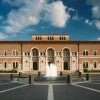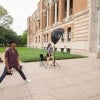
‘Red Book’ story map reveals history of Houston wards’ thriving Black communities
The spatial data retrieved by Rice from the rare 1915 book is now available for free public use via Fondren Library's Woodson Research Center.

‘Red Book’ story map reveals history of Houston wards’ thriving Black communities
The spatial data retrieved by Rice from the rare 1915 book is now available for free public use via Fondren Library's Woodson Research Center.

Past immigration policy can guide future policy, say trio of Baker Institute papers
HOUSTON – (May 6, 2021) – With President Joe Biden’s proposed immigration reforms facing scrutiny from both sides of the aisle, the authors of three papers on the topic from Rice University’s Baker Institute for Public Policy are available to discuss how the past can inform future policy.

The landmark Supreme Court case Plessy v. Ferguson upheld the doctrine of "separate but equal," but for many decades after that segregation was enforced in virtually all aspects of life, including the military.

Baker Institute's Abbey inducted into Texas Aviation Hall of Fame
George Abbey, senior fellow in space policy at Rice's Baker Institute for Public Policy, was inducted to the Lone Star Flight Museum's Texas Aviation Hall of Fame during a virtual ceremony May 6.

In graphene process, resistance is useful
Lab uses laser-induced graphene process to create micron-scale patterns in photoresist for consumer electronics and more.

Nagarajaiah named distinguished member of American Society of Civil Engineers
Satish Nagarajaiah, a professor of civil and environmental engineering and of mechanical engineering at Rice’s Brown School of Engineering, has been elected a distinguished member of the American Society of Civil Engineers (ASCE)

Rice adds Master of Engineering Management and Leadership degree
The Rice University Faculty Senate has approved the creation of a new professional master’s degree in the George R. Brown School of Engineering, the Master of Engineering Management and Leadership (MEML), to become available to students beginning in the fall.

Award-winning writer Kiese Laymon joining English faculty
The critically acclaimed memoirist and essayist will be the Libby Shearn Moody Professor of Creative Writing and English, starting Jan. 1, 2022.


Study explores how private equity acquisitions impact hospitals
Private equity investment in hospitals has grown substantially in the 21st century, and it accelerated in the years leading up the COVID-19 pandemic.

Dashboard developed at Rice will help Texas schools open safely amid pandemic
HOUSTON – (May 5, 2021) – A new dashboard developed by public health researchers at Rice University's Texas Policy Lab (TPL) will help school districts in Texas and parents of school-age students make better and more informed decisions about COVID-19 mitigation amid the pandemic.

Duncan College senior L Diop, Wiess College senior Daniel Davis and Martell College senior Julia Huang snapped photos of their fellow graduates-to-be last week outside Lovett Hall. Find more of the trio’s senior portrait work on their Instagram at @2.8portraits.

Houston can be leader in global plastic sustainability, says Baker Institute expert
Houston, as the intellectual capital for the energy industry, can become a global leader in advanced plastic recycling, according to an expert from Rice’s Baker Institute for Public Policy.

COVID-19 requirements on campus were relaxed last week, allowing members of the Rice community to enjoy some mask-free time outdoors. (Photos by Jeff Fitlow)

Rice soccer knocks off West Virginia to reach Sweet 16 for first time
Three days after notching the program's first-ever victory in the NCAA Tournament, the Rice soccer team danced into the Sweet 16 with a 1-0 upset victory over West Virginia University May 1 in Cary, North Carolina.